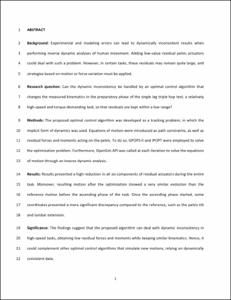Assessment of residual reduction procedures for high-speed tasks

Visualitza/Obre
10.1016/j.gaitpost.2019.07.191
Inclou dades d'ús des de 2022
Cita com:
hdl:2117/174487
Tipus de documentArticle
Data publicació2019-09-01
Condicions d'accésAccés obert
Llevat que s'hi indiqui el contrari, els
continguts d'aquesta obra estan subjectes a la llicència de Creative Commons
:
Reconeixement-NoComercial-SenseObraDerivada 3.0 Espanya
Abstract
Background Experimental and modeling errors can lead to dynamically inconsistent results when performing inverse dynamic analyses of human movement. Adding low-value residual pelvis actuators could deal with such a problem. However, in certain tasks, these residuals may remain quite large, and strategies based on motion or force variation must be applied. Research question Can the dynamic inconsistency be handled by an optimal control algorithm that changes the measured kinematics in the preparatory phase of the single leg triple hop test, a relatively high-speed and torque-demanding task, so that residuals are kept within a low range? Methods The proposed optimal control algorithm was developed as a tracking problem, in which the implicit form of dynamics was used. Equations of motion were introduced as path constraints, as well as residual forces and moments acting on the pelvis. To do so, GPOPS-II and IPOPT were employed to solve the optimization problem. Furthermore, OpenSim API was called at each iteration to solve the equations of motion through an inverse dynamic analysis. Results Results presented a high reduction in all six components of residual actuators during the entire task. Moreover, resulting motion after the optimization showed a very similar evolution than the reference motion before the ascending phase of the task. Once the ascending phase started, some coordinates presented a more significant discrepancy compared to the reference, such as the pelvis tilt and lumbar extension. Significance The findings suggest that the proposed algorithm can deal with dynamic inconsistency in high-speed tasks, obtaining low residual forces and moments while keeping similar kinematics. Hence, it could complement other optimal control algorithms that simulate new motions, relying on dynamically consistent data.
CitacióPallarès-López, R. [et al.]. Assessment of residual reduction procedures for high-speed tasks. "Gait and posture", 1 Setembre 2019, vol. 73, núm. September, p. 116-119.
ISSN0966-6362
Versió de l'editorhttps://www.sciencedirect.com/science/article/abs/pii/S0966636219301262
| Fitxers | Descripció | Mida | Format | Visualitza |
|---|---|---|---|---|
| Manuscript_v2.pdf | 311,2Kb | Visualitza/Obre |


